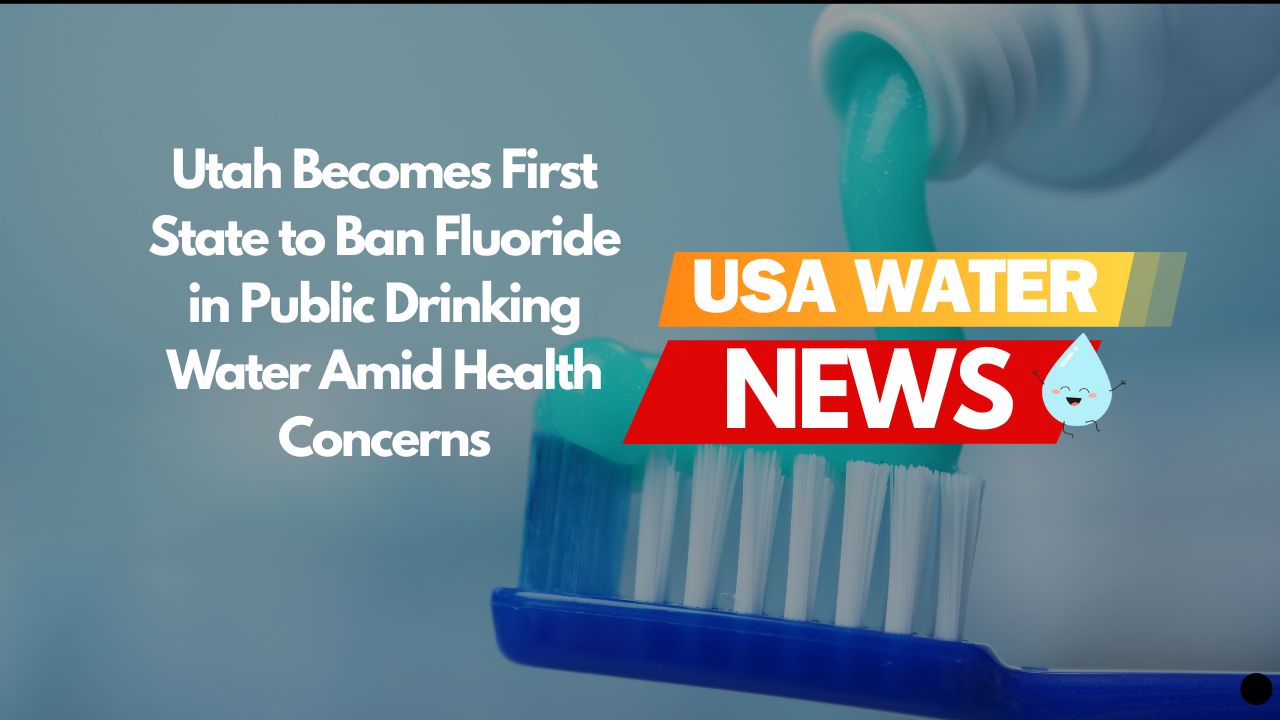Utah just made history by becoming the first state to completely ban fluoride in public drinking water. Governor Spencer Cox signed legislation in March 2025 that prohibits any city or community from adding fluoride to their water systems, sparking a fierce debate about public health, government control, and individual choice.
The ban takes effect May 7, 2025, despite strong opposition from dentists and health organizations who warn it will lead to more cavities, especially in children from low-income families.
What Utah Actually Did
House Bill 81, signed by Republican Governor Spencer Cox, makes it illegal for anyone to add fluoride to public water systems in Utah. The law goes further than any other state by completely removing local control – cities and communities can no longer choose for themselves whether to fluoridate their water.
What the law says:
- No person can add fluoride to public water systems
- Local governments cannot require or permit fluoride addition
- Pharmacists can still prescribe fluoride supplements
- The ban applies statewide with no exceptions
Why it’s unprecedented: While some cities and counties across the U.S. have stopped using fluoride, no state has ever imposed a complete ban that removes local decision-making authority.
The Arguments on Both Sides
This decision didn’t happen in a vacuum. It came after heated debate between public health advocates and those concerned about government overreach.
Why Supporters Wanted the Ban
Individual choice: Bill sponsor Rep. Stephanie Gricius (R-Eagle Mountain) said people shouldn’t be “medicated” by their government without consent. She acknowledged fluoride has benefits but argued it should be a personal decision.
Cost concerns: Lawmakers said adding fluoride to water systems is too expensive for communities to maintain.
Health worries: Some pointed to studies suggesting high fluoride exposure might be linked to lower IQ in children, though these studies mostly came from countries with much higher fluoride levels than used in U.S. water.
Government control: Governor Cox compared fluoridation to being “medicated by the government” and said there should be a “really high bar” for such requirements.
Why Opponents Fought Against It
Proven public health tool: The CDC calls water fluoridation one of the 10 greatest public health achievements of the 20th century. Studies show it reduces tooth decay by about 25%.
Helps disadvantaged communities: For low-income families who can’t afford regular dental care or fluoride supplements, fluoridated water may be their only source of cavity prevention.
Safety record: The American Dental Association and other health organizations say fluoride at water system levels is safe and has been used successfully for over 75 years.
Economic impact: The CDC estimates that fluoridated water saves $6.5 billion annually in dental treatment costs nationwide.
What Utah’s Dentists Are Saying
Utah’s dental community is not happy about this decision and they’re making their concerns very clear.
Real-world experience: Dr. Rodney Thornell, president of the Utah Dental Association, practiced in Salt Lake City both before and after the city added fluoride to its water in 2003. He says the difference is dramatic – adult patients who grew up without fluoride continue to have lots of cavities, while younger patients who had fluoridated water get far fewer.
Harsh criticism: The American Dental Association called the ban “wanton disregard for the oral health and well-being” of Utah residents and said it was based on “distorted pseudoscience.”
Preparing for the worst: Free dental clinics are already preparing for their waiting lists to grow significantly. Salt Lake Donated Dental Services expects to see much more severe tooth decay in children within the next year.
The sugar problem: Utah residents consume more candy and sugary drinks than the national average, making fluoride even more important for preventing cavities, according to dental professionals.
Who Gets Hurt Most by This Decision
The fluoride ban won’t affect everyone equally. Some groups face much higher risks:
Low-income families:
- Can’t afford regular dental checkups
- May not be able to buy fluoride supplements
- Rely on public water as their only source of cavity prevention
- Face longer waits for dental treatment as demand increases
Children:
- Developing teeth need fluoride most
- Kids in families without dental insurance are especially vulnerable
- Cavities are already the most common chronic childhood disease
Rural communities:
- Often lack access to dental specialists
- May have limited resources for alternative fluoride sources
- Could see emergency room visits increase for dental problems
The Health Debate: What Science Actually Says
The fluoride controversy involves competing interpretations of scientific research:
Evidence supporting fluoride safety:
- Used in U.S. water systems for over 75 years with proven safety record
- National Institutes of Health says it’s “virtually impossible” to get toxic doses from standard water fluoridation
- Reduces tooth decay by 25% even in the era of fluoride toothpaste
- Australia study found slightly higher IQ in kids who consistently drank fluoridated water
Evidence raising concerns:
- Federal judge ordered EPA in 2024 to regulate fluoride more strictly due to potential risks to children’s intellectual development
- Some studies link high fluoride exposure to lower IQ, but mostly from countries with much higher levels than used in U.S.
- Recent research suggested possible connections between fluoride and various health issues
The key difference: Most concerning studies involved fluoride levels much higher than what’s added to U.S. drinking water.
What This Means for Other States
Utah’s decision is being watched closely across the country, and other states are considering similar measures:
States considering fluoride restrictions:
- Florida has a similar bill awaiting Governor DeSantis’ signature
- Ohio and South Carolina are considering legislation
- Montana has anti-fluoride bills in the works
States that rejected restrictions:
- New Hampshire, Tennessee, and North Dakota turned down fluoride bans
- Kentucky’s measure to make fluoridation optional stalled
Federal influence: Health Secretary Robert F. Kennedy Jr., who has criticized fluoridation, applauded Utah’s decision and said he plans to recommend that the CDC stop promoting water fluoridation nationwide.
What Happens Now in Utah
The practical effects of this ban are already starting:
Immediate changes:
- Salt Lake City and other communities stopped adding fluoride to water on May 7
- The process was simple – essentially just disconnecting fluoride tanks
Alternative options:
- Pharmacists can prescribe fluoride supplements (tablets or lozenges)
- People can use fluoride toothpaste and mouthwash
- Regular dental treatments provide professional fluoride application
Challenges ahead:
- Fluoride supplements require prescriptions and daily compliance
- Low-income families may not be able to afford alternatives
- Public health officials must find new ways to promote oral health
What This Means for Your Water
If you live outside Utah, this decision probably won’t directly affect your water supply. But it might influence the debate in your area.
If you’re in Utah:
- Your public water no longer contains added fluoride as of May 7, 2025
- You’ll need to get fluoride from other sources (toothpaste, supplements, dental treatments)
- Consider talking to your doctor or dentist about fluoride supplements, especially for children
If you’re elsewhere:
- Your water fluoridation status depends on local decisions
- Contact your water utility to find out if your water contains fluoride
- This controversy may come to your state legislature
The Bigger Picture
Utah’s fluoride ban represents a broader tension between individual choice and public health policy. It raises questions that go beyond just dental care:
Individual rights vs. community health: Should governments make decisions about what goes in drinking water if it benefits public health?
Trust in institutions: The decision reflects growing skepticism of government health recommendations, accelerated by COVID-19 pandemic debates.
Health equity: Policies that let individuals choose may work well for affluent families but could hurt those without resources for alternatives.
Science and politics: How should scientific evidence guide policy when studies can be interpreted different ways?
Bottom Line: A Controversial First That Won’t Be the Last
Utah’s fluoride ban marks a historic shift away from a public health practice that’s been in place for 75 years. Dental professionals warn it will lead to more tooth decay, especially among vulnerable populations, while supporters celebrate it as a victory for individual choice over government mandates.
What’s certain:
- Utah children and adults will likely see more cavities in coming years
- The burden of preventing tooth decay shifts from public water systems to individual families
- Other states are watching and may follow suit
- This decision reflects broader debates about government health policies
What’s uncertain:
- How much tooth decay will actually increase
- Whether alternatives like supplements can make up the difference
- How this will affect national fluoridation policy
- Whether other states will make similar decisions
The reality: This ban doesn’t resolve the scientific debate about fluoride – it just shifts the responsibility for dental health from public policy to individual choice. Time will tell whether Utah’s experiment leads to better or worse health outcomes for its residents.
For families in Utah, the immediate message is clear: if you want fluoride’s protective benefits, you’ll need to get them somewhere other than your tap water.
What You Can Do
- Check your water – Find out if your community uses fluoridated water
- Talk to professionals – Discuss fluoride options with your dentist or doctor
- Stay informed – Follow the debate as it spreads to other states
- Make informed choices – Whether you support or oppose fluoridation, understand the evidence on both sides
- CHECK THE STATUS OF YOUR WATER HERE
Sources: Associated Press, American Dental Association, Utah Legislature, CDC, CNN, NPR | Last Updated: June 24, 2025
Please read – our information
The information presented on cleanairandwater.net is compiled from official water quality reports, trusted news sources, government websites, and public health resources. While we strive for accuracy and thoroughness in our presentations, we are not scientists, engineers, or qualified water quality professionals.
Our mission is to present water quality information in an accessible, real-world format that helps people understand what’s in their water and make informed decisions about their health and safety. We believe that complex environmental information should be available to everyone in a format that’s easy to understand.
We make every effort to ensure our content is current and accurate, but we cannot guarantee that all information is complete or error-free. This website should not replace official communications from your local water utility or health department. We always recommend consulting official sources for the most up-to-date information regarding your specific water system.
Clean Air and Water is not liable for any unintentional errors, omissions, or outdated information. The content on this site is provided for informational purposes only and should not be considered professional advice.

